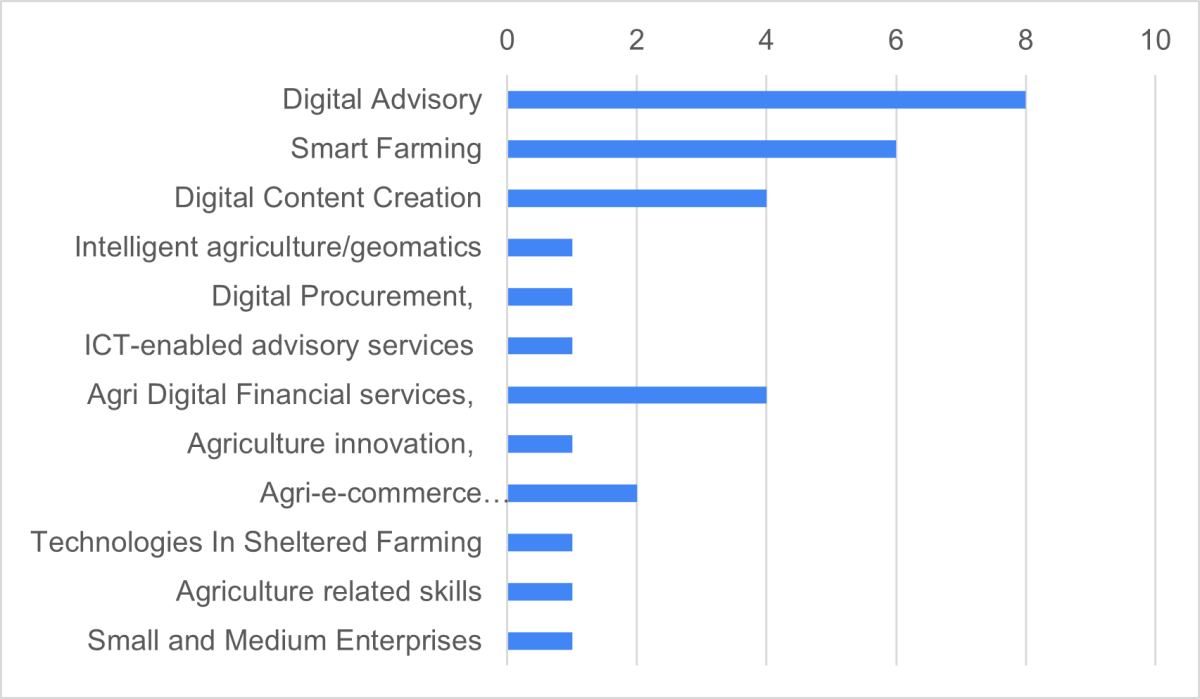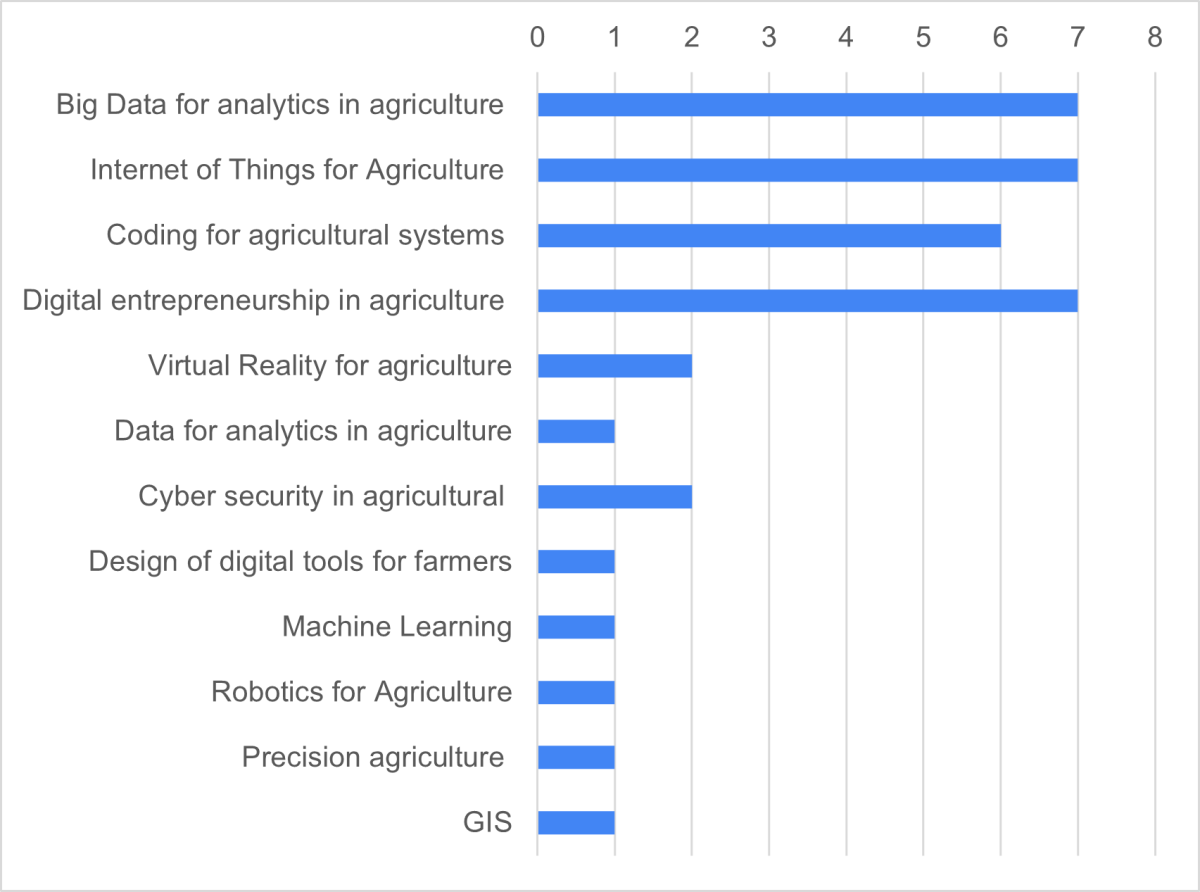![]() The baseline also evaluated the extent to which the current agricultural syllabi in agricultural Universities and innovation hubs facilitates digital agricultural skills development in the region. For further information on the methodology and detailed findings from the region, please download the report here.
The baseline also evaluated the extent to which the current agricultural syllabi in agricultural Universities and innovation hubs facilitates digital agricultural skills development in the region. For further information on the methodology and detailed findings from the region, please download the report here.
The interactive map below highlights where digital agriculture skills training is being provided in higher education institutions and business support organizations such as incubators or innovation hubs.
caption:The interactive map above highlights where digital agriculture skills training is being provided in higher education institutions (marked as a blue diamond) and business support organizations such as incubators or innovation hubs (marked as a green star).
The level of development of digital agriculture training is not uniform in the SADC Region
The table below illustrates where digital skills training and digital agriculture skills training is being provided in the region based on the institutions that were identified and surveyed for the study.
| Country | Digital Skills Training | Digital Agri Skills |
|---|---|---|
| Botswana | ✓ | ✓ |
| Comoros | ||
| DRC | ✓ | |
| Eswatini | ||
| Lesotho | ||
| Madagascar | ✓ | |
| Malawi | ✓ | ✓ |
| Mauritius | ✓ | ✓ |
| Mozambique | ✓ | ✓ |
| Namibia | ||
| South Africa | ✓ | ✓ |
| Tanzania | ✓ | ✓ |
| Zambia | ✓ | ✓ |
| Zimbabwe | ✓ | ✓ |
Table illustrating where digital skills training is provided in Universities in the SADC countries and where digital agricultural skills are being taught in the SADC region.
Incubators rarely have any agri-digital trainings on offer. In some incubators advanced digital training for agriculture such as precision agriculture, digital financing, procurement platform development or IoT solution prototyping for agriculture are offered.
Universities appear to be more advanced in terms of digital training curricula such as AI for agriculture, programming/coding for agricultural systems and design of digital tools to help farmers with crop calendars and weather forecasting.
Agricultural faculties in SADC do not assume direct responsibility for building digital skills capacities
Curricula should be curated based on the needs and aspirations of faculties.
Digital skills training is often taught by a central department in most of the responding SADC universities. While this is an efficient way of managing the training, it often misses the specificity that agricultural training requires.
Digital entrepreneurship training is present in some SADC universities but must be adapted to be fit for purpose

Digital agricultural entrepreneurship aims to expose students to new agricultural entrepreneurial projects, new agricultural products and services, new ways of generating revenue for agricultural initiatives, new opportunities to collaborate with agricultural platforms and partners, and new areas for agricultural competitive advantages.
Digital entrepreneurship in agriculture must adapt to the new opportunities presented by evolving digital technologies. Digital Advisory and Smart Farming are the most common subjects being included in trainings at universities.
The digital entrepreneurship curriculum for agricultural students and practitioners should be refined. There is currently no consistent standard that is being used to guide training in this area which would be beneficial.
Digital agricultural skills training requires that tools or applications be taught using the viewpoint of agricultural needs or relevance.

The need for fundamental IT literacy for agriculturalists and agricultural development must be emphasized. New and emerging skills areas relevant to the agricultural sector must be clearly articulated and demonstrated practically during the delivery of digital agricultural skills training.
The digital agricultural skill areas include cybersecurity, IoT, Artificial Intelligence (AI), mobile technologies, digital marketing, desktop publishing, and Big Data.
Big Data for agriculture, Internet of Things for agriculture, digital entrepreneurship and coding for agricultural systems are widely taught. Other topics are less common.
Vibrant regional collaborative networks must be fostered and encouraged
The Research and Education Networks in the SADC member states (NRENs) are key institutions that provide internet bandwidth services, cloud services and other value-added services to research and education institutions at reduced costs.
The development of strong campus networks and the strengthening of NRENs are key so that SADC higher education institutions and innovation hubs can effectively provide all types of digital services for teaching digital agricultural training, digital agricultural entrepreneurship, and advanced research activities.
The importance of building strong communications infrastructure for higher education and research institutions in the SADC region cannot be over-emphasized.
Such infrastructure is needed to support advanced service digital agricultural delivery through high-speed telecommunications networks.
Icons - credit to NounProject https://thenounproject.com/






